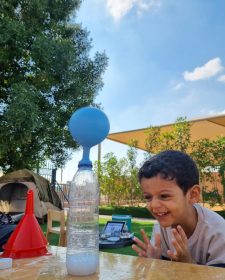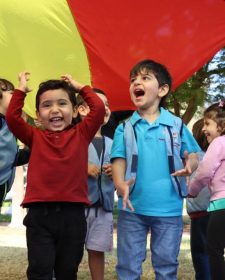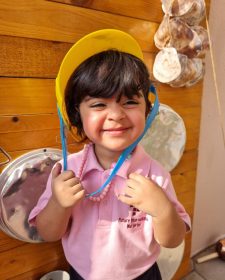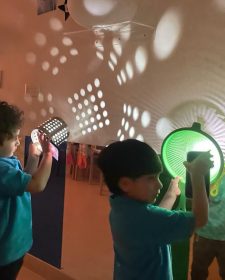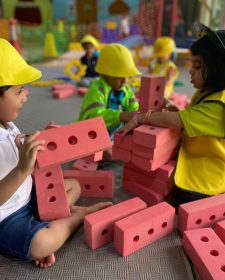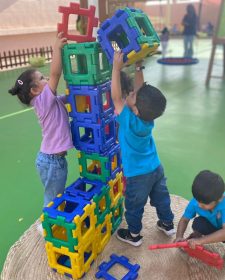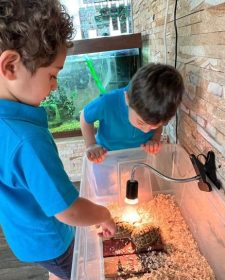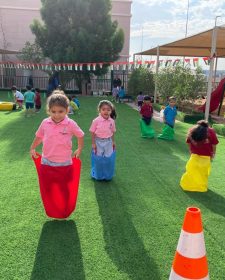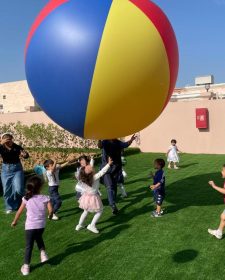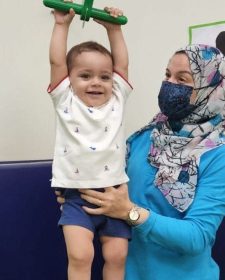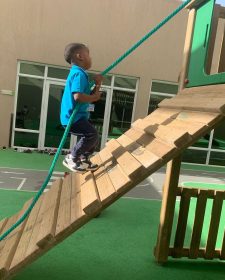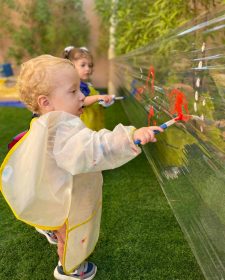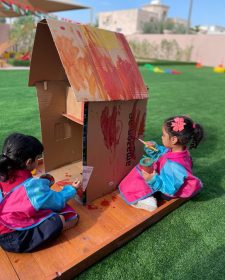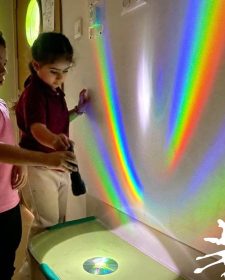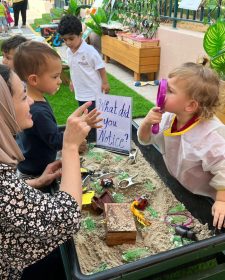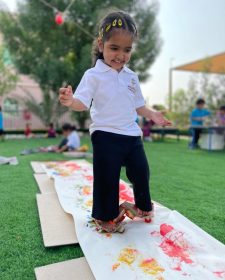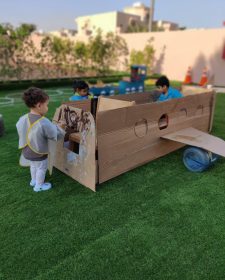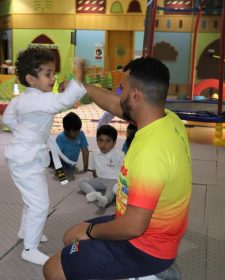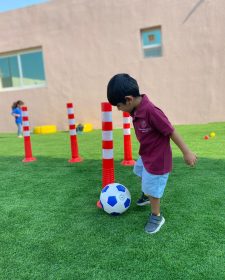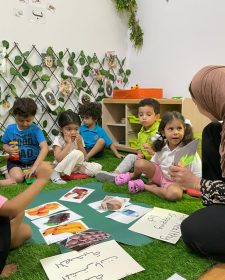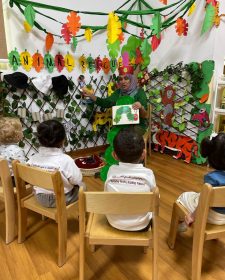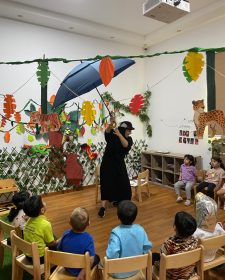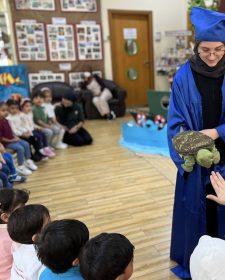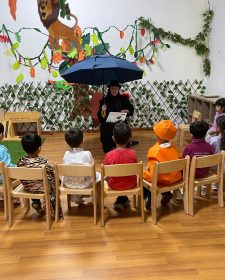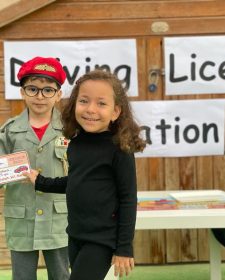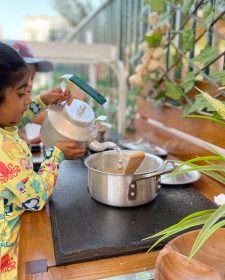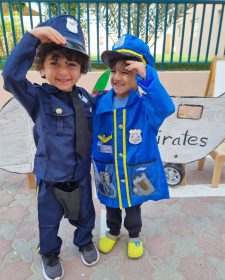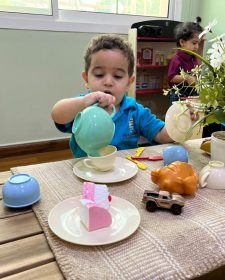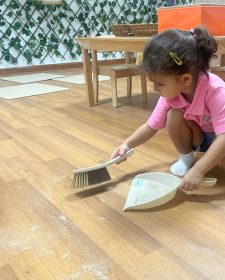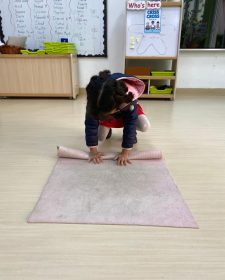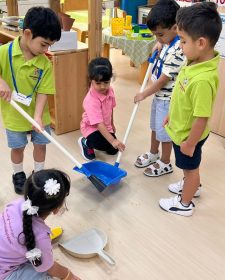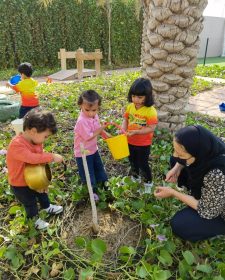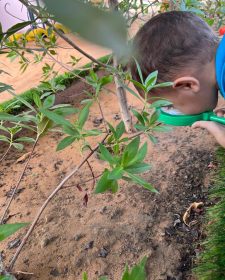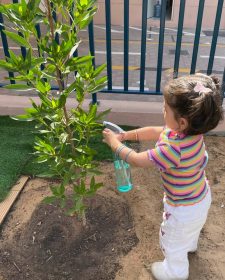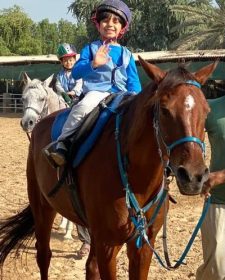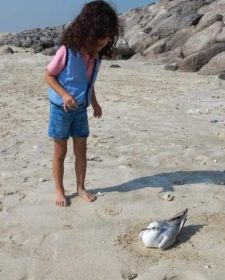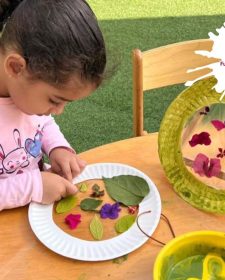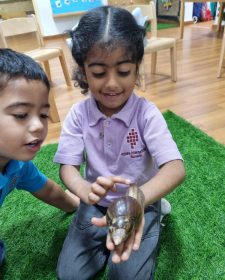With the advancement in neuroscience and early childhood development studies, we have developed a greater understanding of the importance of the early years. We know for instance that early childhood is a critical time for the brain, when connections are being made that become the foundation for a child’s future health, learning, and behaviour.
We commit ourselves to ensuring we keep abreast with latest research in early childhood development, and provide a well-constructed continuous professional development for all our staff, from the teacher assistants to the senior members of the team; growing together as practitioners, to enable children to grow better, is part of what FIN is about.
FIN educational approach and the science behind it
‘Play is essential for children’s development, building their confidence as they learn to explore, relate to others, set their own goals and solve problems’.
(EYFS 2021)
‘Play is often talked about as if it were a relief from serious learning. But for children play is serious learning. Play is really the work of childhood’.
Fred Rogers
FIN learning environment as a safe, engaging, exciting and genuinely happy setting
Having fun and being happy, in a safe and loving environment, is closely linked to learning; there can be no learning without connection, and purposeful engagement.
Simone, one of FIN lead teachers, describes what she notices on a daily basis:
‘Our children love coming here and love this place so much that they can’t get enough of it. We have had many hilarious moments where parents had to put their child in the car and drive by the nursery on weekends to prove that we were closed. Alternatively, the teachers have had to tell them on Friday that there will be no school for 2 nights. We’ve had to make calls to children in the hospital to tell them they needed to stay there, as they didn’t want to miss out on some fun at school. This is what makes this place so great. Children find it a safe space and actually enjoy coming here!’
Adventures outside the classroom
To enrich children’s environment, and to nurture a positive outlook on the world around them, we wanted to make sure we did not confine learning opportunities to the classroom environment; We incorporated in the design of our Early Childhood Centres (ECC) engaging ‘shared spaces’, to which children have access on a daily basis: sensory spaces, different physical activity spaces, a multipurpose role play area, a large scale construction area, etc.
Physical engagement opportunities
We know that young children need to be physically engaged for at least 3 hours per day. So, we made sure we have enough spaces, indoor and outdoor, that enable children to have at least 10 different kinds of physical play…even when the weather becomes too hot. Children use:
- Open spaces for running and ball play: each class has a direct access to an open space.
- Riding track, with signposts, for tricycles and different vehicles.
- Splash and water play areas.
- Outdoor climbing and adventure zones: our apparatus incorporates ladders, rope climbing, step climbing, stairs, sliding, balancing, swinging, etc.
- Indoor soft gyms, with a ball pool, obstacle courses, trampolines and balancing beams.
- Sensory zones: each class has access to a sound wall, and every day children are exposed to a variety of sensory trays indoors and
outdoors. - Spaces for construction and imagination: children are given resources for building dens, tents, paint on a large scale, vertically and horizontally, and build large structures.
- Quiet areas, outdoors and indoors, where children can spend time, in a serene environment, if they feel overwhelmed, or to practise noticing sounds in the environment.
The choice of equipment for our play areas was guided by the fact that we had noticed many children displaying weak gross muscle tone, especially in the upper body, which later on, could affect the development of their fine motor skills. There is also the added excitement for children who love the challenge of climbing with a rope, on a ladder, or with stepping stones!
Active participation and exploration
At FIN, we view children as natural explorers, eager to touch, experiment and lead their own discoveries. Our approach involves creating an environment rich with opportunities for exploration, where adults act as guides rather than instructors. Each morning, children enter engaging learning spaces filled with a range of “curiosity centers” tailored to their interests, both indoors and outdoors. They take the lead by asking questions and experimenting with various resources, fostering their curiosity and learning through hands-on exploration.
Enrichment through art and sport clubs
We collaborate with different companies, such as Tendsetters, Sportsize, and Nujoom, to enrich the FIN program and offer a variety of activities children can develop an interest in, such as ballet, gymnastics, soccer, karate, art, or percussion.
Our Curriculum Framework
We provide a bilingual curriculum based on the Early Years Foundation Stage (EYFS) framework enriched with the International Early Years curriculum (IEYC). The IEYC emphasises child-centred learning, hands-on experiences, and active participation to foster curiosity, exploration, and a love for learning.
The EYFS describes what early years providers must do to promote the learning and development of all children in their care in seven different areas:
Three areas are considered prime areas of learning and development as they form the foundations upon which all further learning is built.
- Communication and Language
- Physical Development
- Personal Social and Emotional Development
There are four other areas that are described as specific areas of learning, through which the prime areas are further applied and strengthened. - Literacy (ability to read and write)
- Mathematics
- Understanding the World
- Expressive Arts and Design
All of these areas are interwoven with each other in order to provide a fully holistic experience to promote each child’s development and growth.
The IEYC supports key areas of learning through holistic enquiry and play-based approaches that cover all areas of development.
- The IEYC approach is based on eight guiding principles:
- The earliest years of life are important in their own right
- Children should be supported to learn and develop at their own unique pace.
- Play is an essential aspect of all children’s learning and development
- Learning happens when developmentally- appropriate teacher-scaffolded and child-initiated experiences harness children’s natural curiosity in an enabling environment-independent and interdependent learning experiences create a context for personal development and are the foundation of international mindedness
- Knowledge and skills development lead to an increasing sense of understanding when children are provided with opportunities to explore and express their ideas in multiple ways
- Ongoing assessment, in the form of evaluation and reflection, is effective when it involves a learning-link with the home
- Learning should be motivating, engaging and fun, opening up a world of wonder for children where personal interests can flourish.
Our long experience in education enables us to continuously enrich our curriculum and offer the best learning environment for our children. We use research-based resources such as the Numicon multi-sensory maths programme to create confident mathematicians right from the start, or the Ben and Betty award-winning phonics approach to help our children develop their love of reading.
Process of Learning
The IEYC focuses on a process of learning rather than relying solely on learning outcomes to drive a child’s development. Our IEYC process of learning captures children’s natural curiosity as a starting point and balances child-initiated and teacher-scaffolded provision within an enabling environment.
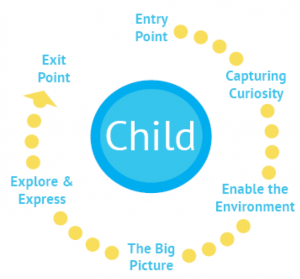
Unique Dual Language Approach
We prioritise language development as we believe it serves as a gateway to success. Research indicates that a child’s proficiency in language prior to starting school is a strong predictor of their success in different critical areas like reading, mathematics, and social skills.
We offer an immersive environment where children have the opportunity to develop proficiency in both Arabic and English. We have adopted a unique approach to bilingual education. Unlike many nurseries where the Arabic teacher is a visitor who joins a few times a week, and English and Arabic are taught in isolation, at Fin, Arabic and English teachers spend the full day together, plan, and coordinate with each other. This ensures that all concepts, stories, themes, and routines are reinforced equally in both languages. Each group of children has an Arabic-speaking teacher and an English-speaking teacher. Every day, children experience a combination of learning approaches: bilingual learning sessions where both teachers are present, focused Arabic sessions, and focused English sessions. This structure and approach ensure that children receive comprehensive language exposure and practice in both languages. It not only facilitates language acquisition and proficiency but also conveys a powerful message about the value of both languages and, by extension, the cultures they represent. We believe in promoting the Arabic language and giving it the same importance as the English language, fostering a sense of pride and identity among all our children.
Our bilingual approach allows children who do not have Arabic as a home language to develop their skills in the national language of the country they live in.
Our focus on language acquisition has also led us to consider how the organisation of the children’s day, routines, and space could offer as many opportunities as possible for back-and-forth adult-child and child-child interactions.
‘All lessons are run jointly by Arabic and English teachers, working closely together to jointly develop the curriculum. Every aspect of education is delivered identically in both languages. Children learn quickly and are inspired’.
Schools Compared Review
Storetelling
Storytelling is a key component of our approach. We introduce a “story of the week” that children experience in English and Arabic, engaging them in interactive reading sessions that foster meaningful back-and-forth interactions.
Pretend play
Research consistently highlights the significance of pretend play in fostering language development, especially when compared to other forms of play. At FIN, we offer children a wide variety of role-play opportunities both indoors and outdoors. We focus is on interacting with children as they explore different concepts, stories, and topics through imaginative play. We also have a dedicated multipurpose role-play area that transforms into different settings such as a supermarket, restaurant, clinic, dentist’s office, fire station, newsroom, vet clinic, salon, construction site, and more. These immersive environments are designed to inspire creativity and curiosity while nurturing language skills and encouraging social interaction among children.
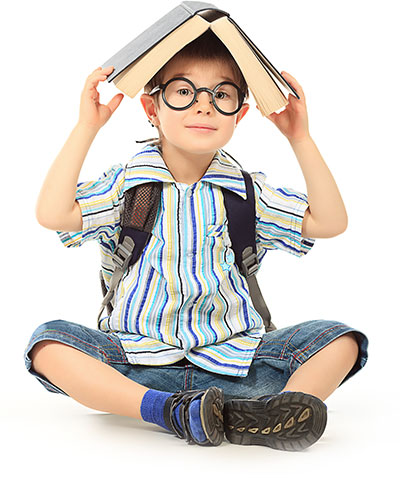
I am neither very clever nor especially gifted. I am only very, very curious!
Einstein
Building Strong Executive Functions
At FIN, we are committed to equipping every child with the foundational elements of executive functions. We firmly believe that a child who can focus, retain information for a purpose, control impulses, and find different problem-solving approaches will excel in any chosen endeavour throughout their life. Recognizing the crucial role of early years, particularly ages 3 to 5, in fostering dramatic growth in these essential skills, we prioritize providing the necessary support for children to develop these building blocks.
How do we achieve this? Our guiding principle at FIN is simple: “DO NOT DO for children what they CAN DO by themselves.” We understand that each child has a unique developmental stage and learning trajectory upon joining the nursery. Therefore, enhancing executive functioning involves personalized teaching moments throughout the day. We emphasize giving children the time and space to practice and refine their skills continuously. During daily routines, implementing hygiene practices, and learning opportunities, children are encouraged to become increasingly independent. Teachers facilitate this growth by using questions to prompt thinking rather than giving direct instructions. The FIN team regularly reviews each day, moment by moment, reflecting on tasks that can be gradually transitioned to children’s responsibilities.
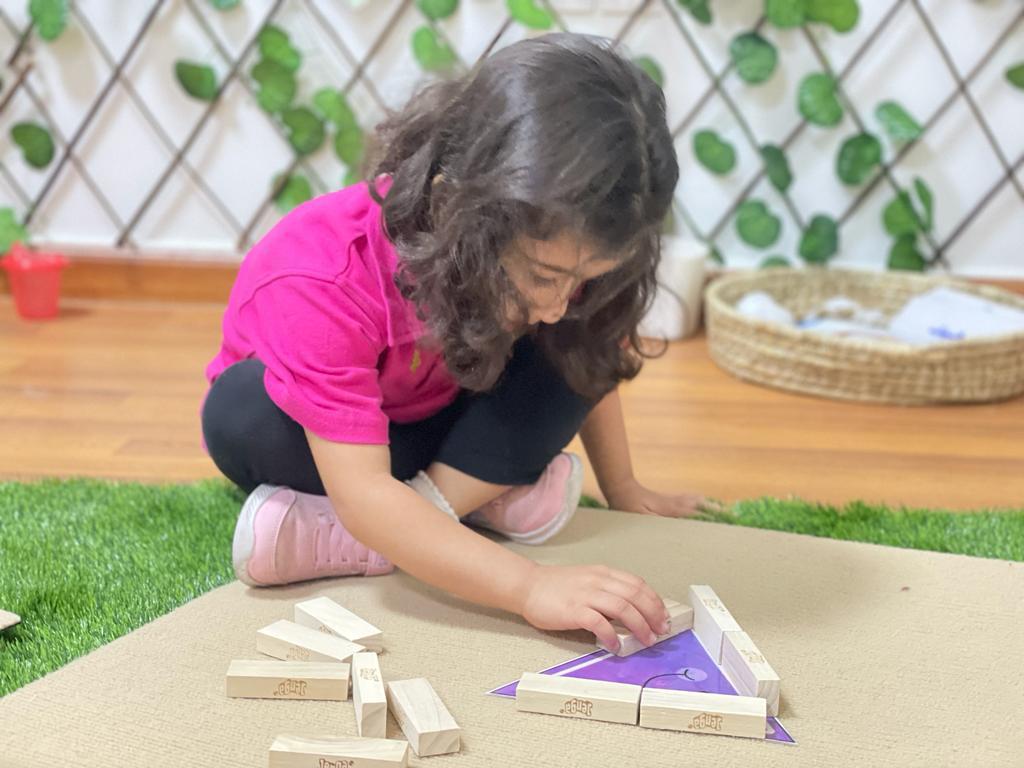
At FIN, we are committed to equipping every child with the foundational elements of executive functions. We firmly believe that a child who can focus, retain information for a purpose, control impulses, and find different problem-solving approaches will excel in any chosen endeavour throughout their life. Recognizing the crucial role of early years, particularly ages 3 to 5, in fostering dramatic growth in these essential skills, we prioritize providing the necessary support for children to develop these building blocks.
How do we achieve this? Our guiding principle at FIN is simple: “DO NOT DO for children what they CAN DO by themselves.” We understand that each child has a unique developmental stage and learning trajectory upon joining the nursery. Therefore, enhancing executive functioning involves personalized teaching moments throughout the day. We emphasize giving children the time and space to practice and refine their skills continuously. During daily routines, implementing hygiene practices, and learning opportunities, children are encouraged to become increasingly independent. Teachers facilitate this growth by using questions to prompt thinking rather than giving direct instructions. The FIN team regularly reviews each day, moment by moment, reflecting on tasks that can be gradually transitioned to children’s responsibilities.
Reconnecting with Nature
A growing body of research shows that a connection to the natural world is fundamental to all aspects of child development: unstructured outdoor play has holistic benefits for children and helps them build optimal mental, emotional, social and physical health.
Our approach is rooted in the belief that young children thrive in environments where they can explore, learn, and grow without the constraints of a traditional classroom setting. We understand that learning is not limited to structured lessons or activities; rather, it is a continuous process that unfolds throughout the daily experiences and interactions. By providing children with the freedom to move, assess risks, make choices, observe, and experiment in open outdoor spaces, we create an ideal environment for holistic learning, including social skills, physical coordination, language acquisition, and emotional well-being. We have observed firsthand that children are simply happier when they have the opportunity to engage with nature and be outdoors.
To expend on the exposure children have with the natural world, we regularly take the children to outdoor areas, where they can experience great interactions with the natural world: picking up their own vegetables, feeding animals, or simply enjoying time in a park.
We are privileged to live near the seaside, with its endless learning opportunities: experiencing the rhythm of the waves, the gathering of shells, pebbles and corals, the development of safety awareness.
To expend on the exposure children have with the natural world, we regularly take the children to outdoor areas, where they can experience great interactions with the natural world: picking up their own vegetables, feeding animals, or simply enjoying time in a park.
We are privileged to live near the seaside, with its endless learning opportunities: experiencing the rhythm of the waves, the gathering of shells, pebbles and corals, the development of safety awareness.
Rooted in Values
FIN’s approach to nurturing positive self-concept in every child
One of the first responsibilities we have, as early years education providers, is to enable children to develop confidence, a positive self-concept and a high level of self-esteem.
In that regard, we acknowledge our children’s heritage, culture and beliefs, thus empowering them to feel secure, confident and to take pride in their identity.
For many children in the UAE, registering in an early childhood centre will represent their first major encounter with influences outside of their home environment. For the children who have Arabic as their first language, entering the classroom means entering into a mode of second language acquisition. Once the child settles, the class becomes like a second family. We wanted to avoid giving to the children the implicit message that Arabic was not ‘important’, and that the Arabic teacher – who speaks the home language of many of our children – is only a ‘visitor’ in the class and does not belong to the ‘family’… This is why we adopted an approach to bilingualism in which both Arabic and English languages ‘belong’ to the classroom environment and exist together throughout the daily routine.
